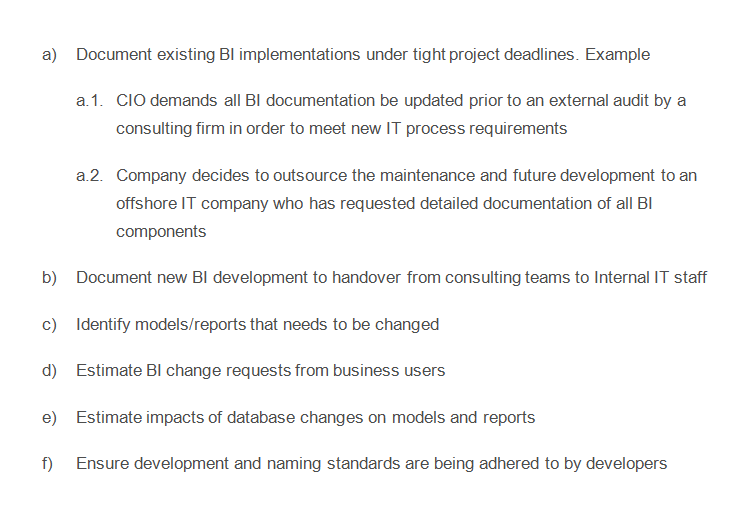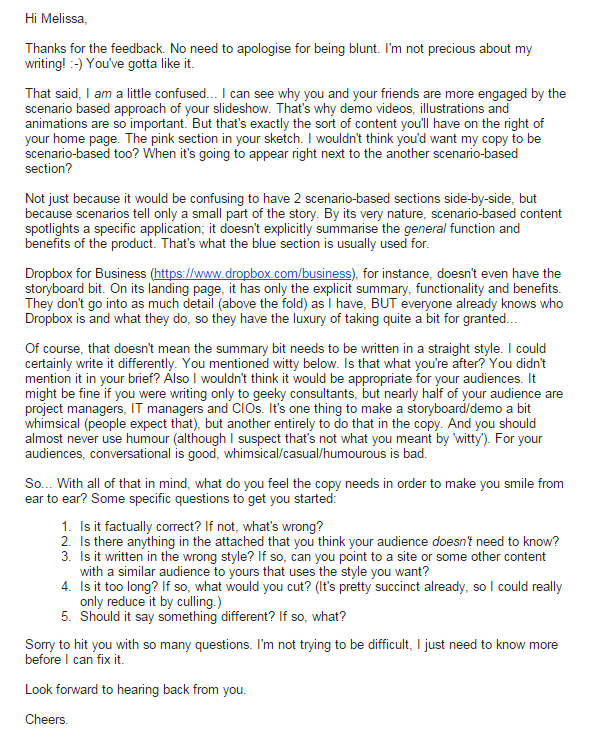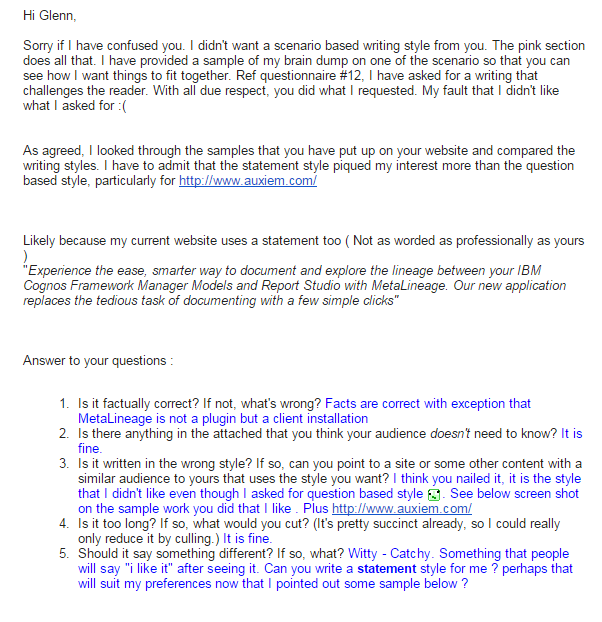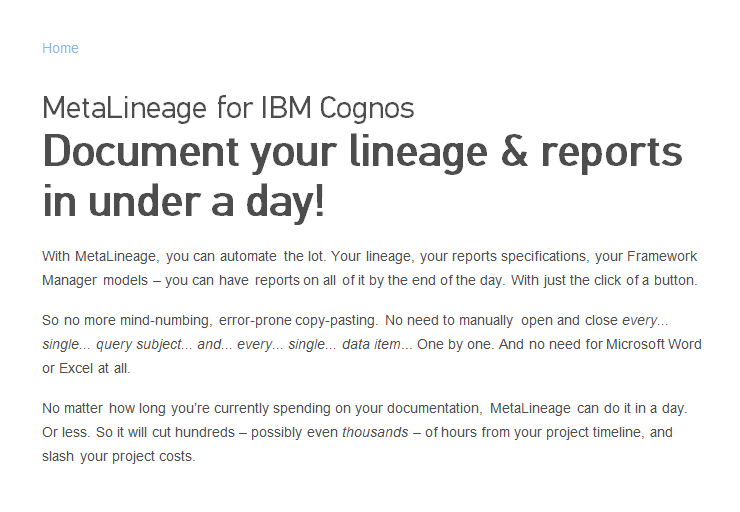How to not get offended when clients don’t like your copy (and an example of when I didn’t)
June 18, 2015 • Glenn Murray

I’m always disappointed if a client doesn’t like my first draft. But I’m rarely offended (anymore). Because usually they have a good reason.
It’s not always clear what that reason is, but I’ve learned over the years that if a client doesn’t like what I’ve written, it’s usually because I’ve missed the brief somehow.
For example, I wrote some IT copy for a client recently. In her brief for the home page, my client said,
“When the reader arrives at the home page, I want them to be challenged as per the attached slideshow. Main point: Cost effective, immediate ROI.”
She also said she wanted me to address these challenges:
I was very chuffed with my first draft. I thought I had delivered on the brief perfectly:
Unfortunately, my client wasn’t as happy with it as me. This was her feedback on the first draft:
I was definitely disappointed when I read this. I’d put a lot of time and effort into the copy, and I was frustrated that I had to rewrite it. Especially as the client’s feedback didn’t really give me any clues as to what I’d done wrong.
But I assumed I had done something wrong, so I set about finding out what it was. I replied with this…
(It’s a long email, but I chose not to call the client to discuss, because I knew she’d need time to consider her answers, and I didn’t want her to feel I was pressuring her.)
Later that night, my client replied with this:
And there I had it. She didn’t like the questions in the copy; she wanted statements. So I addressed that and tweaked the style to be a bit more informal (and made some other more technical and routine changes). This is what we ended up with:
And I’m pleased to say, my client was perfectly satisfied:
The moral to the story? Don’t assume your client is saying you’re a bad copywriter just because they didn’t like what you wrote. Instead, assume you missed the brief somehow or that maybe the brief was lacking. (Clients don’t always know exactly what they want until they’ve seen what they don’t want.)
It works for me. Quite a few of my clients have disliked their first draft. But most have loved the final outcome, just as Melissa did.
Sure, I still rant every now and then about the pedant who forbids me from starting sentences with conjunctions, then tells me his copy sounds a bit disjointed. Or about the non-native English speaker who engages me to fix her English then corrects my grammar. And yes, on those occasions, I suppose I am a little offended that they’d ignore my professional opinion because of something their English teacher said back in high school.
But mostly, when my clients don’t like what I write, I assume they have a reason other than “you’re not a good copywriter”.









Belinda Weaver @ Copywrite Matters wrote on June 18th, 2015
The thing I like BEST about this post Glenn is that you actually weren't precious about your words. It is our job to figure out the best way to connect clients and customers and sometimes we don't nail it. We have to dig further and figure out where the gaps are. Great tips on attitude and approach on nailing the second version!
Reply
Glenn Murray wrote on June 18th, 2015
Thanks Bill. Yeah, no point being precious. :-)
Reply
Ben Lloyd wrote on June 18th, 2015
I gave up being precious about my copy long ago, but sometimes it is galling when you can't figure out exactly where you went wrong. Thanks very much for sharing your client communications though - these are great inspiration for sorting out my own problems in future!
Reply
Glenn Murray wrote on June 18th, 2015
Thanks mate. Yeah, you're right. Precious just isn't a good long-term strategy.
Reply
Trish Arnott wrote on June 20th, 2015
Glenn, out of the whole post, the sentence that leapt from the page was, "Clients don’t always know exactly what they want until they’ve seen what they don’t want." I've had a couple of experiences with that lately...resolved happily. Given that said client calculated that I'd need twice the time I'd take normally, smiles all 'round.
Reply
Glenn Murray wrote on June 22nd, 2015
Yeah, they definitely don't. Glad you sorted yours too! How did you manage it?
Reply
Trish Arnott wrote on June 22nd, 2015
Sucked it up and made the revisions. It costs them more than if they listen to me but they're happy to pay. Both were basically about using my copy but in a different format that client decided on AFTER I'd written the piece. You know how it is: “We want this and this and this and this other thing in twice, and a story and two calls to action.” I make suggestions, write the stuff they’ve asked for and then they say, "Actually, now we can see we only need these bits."
Reply
Glenn Murray wrote on June 22nd, 2015
Ah right. So it was an hourly rate? Mine was fixed price.
Reply
Miranda Hill wrote on June 23rd, 2015
I'm a bit late to the party with my comment but thanks for sharing this. I also had this happen a while ago, and it was hard at first to not take it personally. I took it on the chin, hit delete and started with a delightfully empty, blank page. You see, our problem had been with our client being too prescriptive with his brief. He also provided oodles of content for us to include which clouded the situation. Our second version was great and the client loved it. And the lesson we took from it....start with a blank page and don't try to rework client content. The results are ALWAYS better. As they said, they don't always know what they don't want till they've seen it.
Reply
Glenn Murray wrote on June 23rd, 2015
Hi Miranda. Yes, I completely agree with your summary. In fact, I recorded a video on this back in 2009: 'You can't fix client supplied copy. Don't try!' - https://www.divinewrite.com.au/copywriting/fix-client-supplied-copy/ Also, I try to avoid reading too much from the client (or their competitors) before I start writing. You don't have to use it as a starting point for your copy for it to cloud the situation. You only have to read it.
Reply